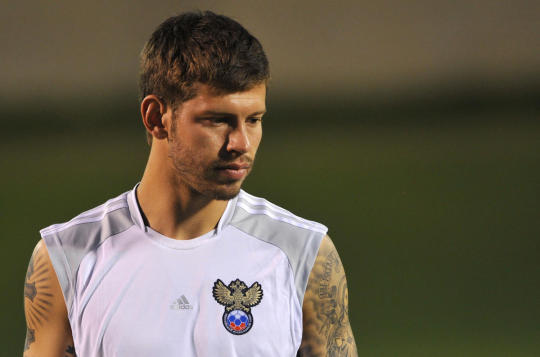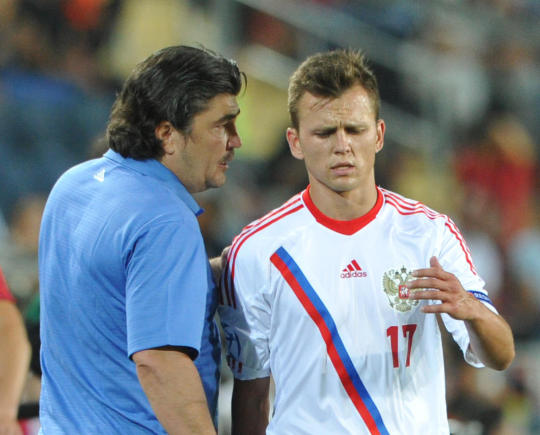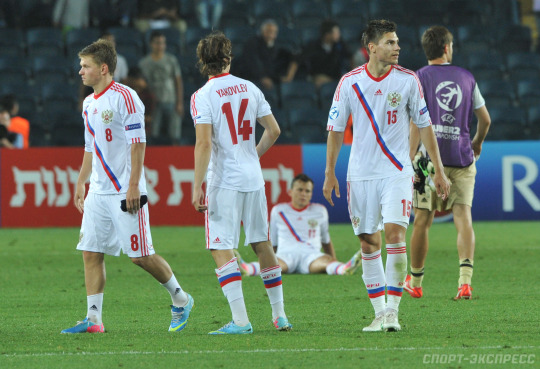#nikolay pisarev
Text
“Fart must be earned. Khimki needs to get him back" - Kukharchuk
“Fart must be earned. Khimki needs to get him back” – Kukharchuk
Photo: © RIA Novosti / Alexey Filippov
Khimki midfielder Ilya Kukharchuk believes that the game that Spartak Gogniev puts on the team from the Moscow Region should bring a result that is not yet available.
Gogniev replaced Nikolai Pisarev as Khimki head coach on 2 September.
– Fart must be earned. Khimki needs to return it. Now I’m a bit unlucky. But that only comes through hard work and a good…
View On WordPress
0 notes
Photo

Ukrainian Dancer Ivan Putrov - photo by Nikolay Pisarev
#ivan putrov#nikolay pisarev#ukrainian ballet dancers#danc#balle#dance#danseur#ballerino#bailarín#tänzer#boys of ballet#ballet men
43 notes
·
View notes
Photo

Я обязательно выживу...
#russia u21#euro u21 2013#still bad at recognizing faces#sergey bryzgalov#pavel yakovlev#sergey petrov#nikolay pisarev#oleg shatov#aleksandr zotov#denis cheryshev#andrey panyukov#maksim grigoryev#maksim belyayev#stanislav kritsyuk#aleksandr filtsov#nikolay zabolotny#taras burlak#roman yemelyanov#aleksey nikitin#yuri kirillov#nikita chicherin#georgi shchennikov#maksim kanunnikov#ibragim tsallagov#shota bibilov#ivan knyazev#dmitri kayumov
3 notes
·
View notes
Quote
The Russian intelligentsia was always extremely active and independent. It was never in the service of the princes of this world, it defended truth, sought, moved forward. 'Intelligentsia' is a Russian word.
Andrei Tarkovsky
#andrei tarkovsky#intelligentsia#intellectual culture#truth#nikolay dobrolyubov#dmitry pisarev#vissarion belinsky#intellectual wealth#intellectualism#russian#culture
8 notes
·
View notes
Text
Nardoniks & Eternal Return
In the spring of 1874, the Narodnik intelligentsia left the cities for the villages, "going to the people" in an attempt to teach the peasantry their moral imperative to revolt. They found almost no support. Given the Narodniks' generally middle- and upper-middle-class social background, they found difficulty relating to the impoverished peasants and their culture. They spent much of their time learning peasant customs, such as clothing and dancing. Narodniks were viewed with suspicion by many Russian peasants, who were completely removed from the more modernized culture of the urban sphere. The authorities responded to the Narodniks' attempt with repression: revolutionaries and their peasant sympathizers were imprisoned and exiled.
One response to this repression was the formation of Russia's first organized revolutionary party, Narodnaya Volya("People's Will"), in June 1879. It favoured secret society-led terrorism, justified “as a means of exerting pressure on the government for reform, as the spark that would ignite a vast peasant uprising, and as the inevitable response to the regime's use of violence against the revolutionaries”. The attempt to get the peasantry to overthrow the Tsar proved unsuccessful, due to the peasantry's idolisation of the latter as someone "on their side". Narodism therefore developed the practice of terrorism: the peasantry, they believed, had to be shown that the Tsar was not supernatural, and could be killed. This theory, called "direct struggle", intended "uninterrupted demonstration of the possibility of struggling against the government, in this manner lifting the revolutionary spirit of the people and its faith in the success of the cause, and organising those capable of fighting". On March 1, 1881, they succeeded in assassinating Alexander II. This act backfired on a political level, because the peasantry were generally horrified by the murder, and the government had many Narodnaya Volya leaders hanged, leaving the group unorganized and ineffective.
However, these events did not mark the end of the movement, and the later Socialist-Revolutionaries, Popular Socialists, and Trudoviks all pursued similar ideas and tactics to the Narodniks. The philosophy and actions of the Narodniks therefore helped prepare the way for the Russian revolutions of 1905 and 1917.
The Narodniks during in the 1870s failed to initiate a peasant revolution against the Russian autocracy because (1) they manufactured an idealized image of the peasant classes that was not reflected in reality, (2) there was a lack of unity within the movement, (3) the peasants could not economically or intellectually relate to the Narodniks and (4) the government repressed the movement.
Russian political activists and government officials often claimed to be working to improve the lives of Russian peasants; in reality, they were manipulating the image of the peasant to further their own political objectives. Narodniks saw the peasant commune as a Russia that had not been tainted by western influence; Alexander Herzen wrote that the narod was “the official Russia; the real Russia.” By having a biased understanding of the peasantry, the Narodniks struggled to relate to the peasantry. A populist desire to think only the best of the narod led to unbound faith in the Narodnik system of propagandizing; that faith led to naivety and ultimately failure.
Idealizing the narod caused the Narodniks to make mistakes with how they approached rural Russians. Rural Russians were typically highly devoted to the Tsar and to the Orthodox Church; not understanding this, the Narodnik rhetoric blamed the Tsar and centralized religion for the peasants’ lack of land and material resources. Another example of the cultural disconnect between the intelligentsia and the peasants in the “to the people” movement was the Narodniks propagandizing through pamphlets when virtually all poor Russians were illiterate. In essence, the Narodnik movement in 1874 failed because they approached the peasants as though the peasants were intellectuals like themselves. Radicals in the latter part of the 1870s would learn that their concept of the narod was flawed, and intellectuals would have to instead make themselves into peasants to have success in the movement and begin a revolution against the government of Alexander II. Nikolay Chernyshevsky’s “anthropological principle” held that all humans, regardless of class, have many intrinsic similarities, and intellectuals saw in the peasants a purified version of themselves that could be radicalized; time demonstrated that this was simply not the case.
The second cause of Narodnik failure—disunity—is best demonstrated by the split in the movement between Bakunists and Lavrists. The former believed revolution among the peasantry and populist uprisings in Russia would begin in the immediate future, the latter believed that propaganda should precede revolution, and the process would be more gradual. Bakunists believed that the peasants were ready to revolt with little propagandizing, whereas the Lavrists thought that considerable effort would be needed for the uprisings to begin. A lack of ideological unity resulted in varied approaches to the movement, and because of this the Narodniks no longer presented a united front to rural Russia. Some Narodniks believed in propagandizing by staying in one area for an extended period of time and assimilating into a commune that they were trying to revolutionize (“settled” propaganda), and others practiced propagandizing by using pamphlets and literature to maximize the number of people that the message reached (“flying” propaganda). Both methods had their weaknesses; settled propaganda fostered mistrust because of cultural and religious differences between the intellectuals and the peasants, while flying propaganda simply lacked depth.
Many Narodniks felt extremely lonely among the peasantry—they longed for their lives in the cities and for the company of other intellectuals. These longings weakened the motivation of many Narodniks and removed much optimism from the movement. Most important, however, was the failure of the Narodniks to present a unified message when going “to the people.” All Narodniks resented foreign intervention into Russia, wanted Russian communes to control their own economic policies, and believed that the emancipation of serfs in 1861 caused peasants to become further impoverished. A lack of unity inhibited these messages. Narodniks believed that the Tsar had crippled the peasants, but Narodniks should have understood how highly the peasants regarded the Tsar. They believed that like them, they were a victim of the Russian bureaucrat. By failing to present a disciplined message and avoid directly attacking the Tsar, the Narodnik message was often simply ignored. It was not until the formation of Narodnaya Volya in 1879 that young revolutionaries saw the need for organization and a disciplined message.
This lack of unity is responsible for the third reason that the “going to the people movement” failed; the peasants did not receive the intellectuals well. The reception that the intelligentsia received in the communes was so poor that it destroyed their idealized image of the peasant that was so common prior to 1874. The Narodniks saw peasants as a unified body; they thought that all peasants dressed poorly, so intellectuals dressed as poorly as was possible in order to fit in. In actuality, the peasants saw a poorly dressed person as a person with no authority or credibility. Accordingly, intellectuals dressing as they imagined the peasant dressed had an adverse effect; it actually made peasants suspicious of the intellectuals. Furthermore, Narodnik propaganda failed to address the more mundane, ordinary concerns of the peasantry. The everyday troubles of a rural Russian—a lack of material goods, poor healthcare, etc.—left little time for discussions of socialism or egoism.
Feminism in the Narodnik movement was also hard for the peasantry to accept. Pre-Marxist revolutionaries believed in an unusually strong equality of sex, and educated noblewomen played major roles in radical movements in the latter decades of the nineteenth century. Russian revolutionary literature in the 1840s and 1850s linked the causes of emancipation of serfs with the emancipation of the Russian woman—this literature was manifest in the Narodnik movement. The Narodniks promulgated Chernyshevskyan ideas of chaste cohabitation—that men and women should live together with no sexual interactions—and gender equality. These concepts were extremely odd to most peasants, and they did not generally react well to them. Furthermore, Narodniks often lived in communes where non-married men and women slept and lived in the same rooms. To Orthodox Russian peasants in the 1870s, such disregard of gender norms were both offensive and off-putting. When you consider the fact that nearly 60% of Narodnik women were from wealthy classes it becomes clear why the Russian peasant could not relate to most intellectuals in the movement intellectually, economically or socially.Historian Dmitri Pisarev writes that “sensing their inability to act alone, the intelligent radical made the peasantry the instrument to realize their hopes.” The peasants did not readily welcome being a vessel for the revolutionaries. The Narodniks believed that the peasants were the class in Russia most prone to revolution, yet the peasants were not ready for revolutionary action.
The more the government tried to repress the Narodniks, the more radical the Narodniks became. They grew increasingly selective in their membership, and their Zemlya i Volya (Land and Freedom) members would eventually evolve to form more terroristic organizations: Narodnaya Volya (The People’s Will) and Chornyperedel (Black Repartition). These groups sought to begin a revolution through violence, and when members of Narodnaya Volya killed Tsar Alexander in 1881, the larger Narodnik movement lost virtually all support in the communes and rural parts of Russia. Government oppression further radicalized the Narodniks, and the peasants could not support enhanced radicalization of the already radical intelligentsia.
The Marxist historian Eric Hobsbawm detected a Narodnik influence on Bolshevist method. "Lenin’s Bolsheviks owe more than they have sometimes admitted to the experience and methods of work of the Buonarrotist-Narodnik tradition, though Marxist antiritualism has done its best to establish an atmosphere of deliberate and extreme matter-of-factness and colourlessness even in cloak-and-dagger activities which, as their popular name shows, tend to compensate for the extreme tension in which participants are involved by a certain amount of romanticism."
https://en.m.wikipedia.org/wiki/Narodniks
#nardonik#nardoniks#bolshevik#bolshevism#communism#socialism#ussr#russia#revolution#anarchism#leftist#leftism#lenin#anarchist#propaganda#strategy#tactics
0 notes
Photo

Karim Abdullin - Bolshoi Ballet - photo by Nikolay Pisarev
#karim abdullin#bolshoi ballet#bolshoi theatre#nikolay pisarev#ballet men#dance#ballet#dancer#danseur#bailarín#ballerino
7 notes
·
View notes
Photo



Что такое survive?
#fyodor smolov#fedor smolov#nikolay pisarev#denis cheryshev#oleg shatov#pavel yakovlev#maksim belyayev#russia u21#euro u21 2013#still bad at recognizing faces
1 note
·
View note